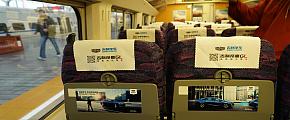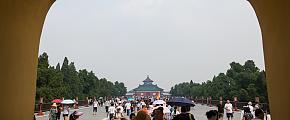China Travel Guide
Country Overview
A fascinating mixture of ancient customs and modernity waiting for those willing to follow the steps of Marco Polo.
China will make you travel through history, from the reminiscences of early dynasties to the vibrant life in a modern megalopolis, from thousand-year-old pagodas to cloud-piercing skyscrapers. Famous landmarks such as the magnificent Great Wall and the Forbidden City in Beijing or the Terracotta Army in Xian are not to be missed, but China has so much to see and do that you will have to start planning your return even before leaving.
Country at a Glance
- Capital: Beijing
- Population: 1.4 billion
- Language: Mandarin, Cantonese (Guangdong Province, Hong Kong, Macau), Local Dialects
- Currency: Renminbi (CNY)
- Time zone: GMT +8
- Electricity: 220 V / 50 Hz. Sockets: Type A, Type I, Type C
- Dialing code: +86
Best Time to Visit China
Spring and autumn are the best seasons for traveling to China, with reasonable temperatures and limited amount of rain. Summers are very hot in most of the country, while winters are usually extremely cold, especially in the north. Southern cities experience monsoon rainfall during summer. Most cultural and historical attractions are not affected by weather conditions.
Most of the country's working population travel during the public holidays, so better think twice before visiting China during the Spring Festival (Chinese New Year, dates change every year according to the Lunar Calendar) or the National Day (first week of October), when many businesses close and massive crowds take over every touristic destination.
Top Cities to Visit
For a trip to such a big country in terms of size, population and history, choosing which cities to visit can be a challenging task; there are countless options and limited time. But we can help you tailor-make an itinerary around your interests and preferences. Below are some of the most popular options for those who travel to China for the first time.
Beijing
The Northern Capital and political center of China is home to many historical and cultural landmarks such as the Great Wall or the Forbidden City. But, during the last decades, Beijing has become a vibrant and modern megalopolis, the flagship of China's economic development and progress.
 Beijing
Beijing
Shanghai
The largest city in the country is a global center where the futuristic skyscrapers of Pudong district and the colonial buildings of The Bund coexist in perfect harmony. A cosmopolitan paradise for shopaholics and food-lovers.
Xi'an
The Terracotta Army, one of the greatest archaeological discoveries of all time, gave Xi'an worldwide fame. More than 8,000 clay warriors protecting the tomb of China's first emperor. But the capital of Shanxi province has a lot more to offer.
Guilin
The starting point of the famous Li River cruise, Guilin is a charming city surrounded by breathtaking limestone karsts, depicted on the 20-yuan banknotes. As the saying goes: "Guilin's landscape is the best under heaven".
Chengdu
This modern megalopolis in Sichuan province is the place to see China's cutest black-and-white creatures -the giant pandas- and to thrill your taste buds with the spiciness of world-famous Sichuan cuisine.
 Chengdu
Chengdu
Hong Kong
The former British colony, where East meets West, has mixed people and influences from almost everywhere under its iconic skyline until becoming one of the most significant financial and cultural centers in the world.
Lhasa
Hidden on the northern slopes of the Himalayas at 3,700 meters above sea level, Lhasa has been the center of Tibetan Buddhism for centuries. In addition to numerous temples and monasteries, Lhasa houses the majestic Potala Palace, former residence of the Dalai Lamas.
Huangshan
In the Yellow Mountains, the beauty of sharped granite peaks and oddly-shaped pine trees shrouded in a sea of clouds has inspired Chinese art and literature and attracted travelers since ancient times.
Hangzhou
Located at the southern end of the Grand Canal and described by Marco Polo as "City of Heaven, the most beautiful and magnificent in the world", Hangzhou owes much of its well-deserved fame to the stunning West Lake.
Top Things to Do
Big and diverse, China offers limitless options to its visitors, from historical sightseeing to art galleries or food tours. Surely there are unmissable attractions and activities, such visiting the Forbidden City in Beijing or the Terracotta Warriors in Xian, but every city has unique experiences that will help you make the most of your journey.
Climb the Great Wall
One of the most iconic sites in the world and an essential in any trip to China. The most visited sections are Badaling, Mutianyu and Jinshanling; all of them within a short drive from Beijing. Take the cable car up to the Wall and enjoy spectacular views of the surrounding scenery while hiking.
Hutongs Tour
There is not a better way to discover the charms of old Beijing and mingling with the locals than taking a tour on a traditional rickshaw around the city's hidden neighborhoods and narrow streets known as hutongs. You can also learn to cook some Chinese dishes with a local family.
Take a River Cruise
Enjoy fairytale views of Guilin's dramatic karst landscape aboard a Li River cruise or take a journey through the heart of China along Yangtze River; a cruise along the country's most scenic rivers will be a highlight of your trip.
 Li River Cruise
Li River Cruise
Sichuan Hot Pot
The flagship of Sichuan cuisine will put your palate to the test. A boiling pot of spicy soup in the center of the table accompanied with raw meat and vegetables that you have to cook in it. Sichuan peppercorns will create a unique numbing sensation in your mouth!
"A Symphony of Lights" in Hong Kong
One of the most spectacular light and sound shows in the world takes place every evening in Hong Kong, when the iconic buildings on both sides of Victoria Harbour light up with searchlights, lasers, and LED screens, creating a multimedia show that transforms the city's skyline into an audiovisual feast.
Overnight at Huangshan
Take a trip to the Yellow Mountains and you will be rewarded with breathtaking natural scenery; majestic granite peaks, verdant pine trees and views of the clouds from above. But watching the sunset from the top can be an experience of a lifetime.
Food Tour in Shanghai
This is the city's most authentic culinary experience! Join a local insider and get off the beaten path to discover restaurants and dishes you would never find on your own. Tasting Shanghai food scene has never been so easy.
Attend a Chinese Show
Chinese performing arts are amazing and impressive; often honed through generations and centuries of traditions. Whether an acrobatic show, kung fu, Sichuan Opera with face changing or Liu Sanjie Impression, it will be an unforgettable experience.
Things to Buy
It is no secret that China is a shopping paradise. Shanghai and Hong Kong are famous, among many other reasons, for their luxury boutiques. But every city or even small town has all kind of options, from big shopping malls to night markets, to satisfy the shopping thirst of every traveler. In street markets, try to bargain as much as possible.
Silk
Silk was first produced in China, and nowadays the country is the world’s largest silk producer. Although silk clothes it can be found almost everywhere, the picturesque city of Suzhou, near Shanghai, is famous for its silk industry.
Tea
China has a long tradition of tea drinking, with thousands of plantations spread across the country. If you go to Hangzhou, try the famous Longjin (Dragon well) green tea. Porcelain tea sets and pots can be a nice souvenir to take home as well.
Pearls and Jade
Rooted deeply in Chinese culture, pearls can vary in size, shape and color. In Hong Kong, check out the Jade Market in Tsim Sha Tsui. Make sure to buy these from certified stores to ensure they are authentic.
Calligraphy Artworks
Ancient Chinese proverbs handwritten in characters are one of the most popular mementos that travelers take home after a trip to China. Calligraphy writing sets are also highly sought after.
What to Eat
It is common for Chinese people to greet each other by asking "Have you eaten?"; food is attached to their emotions and regarded with the utmost importance. When they go back to their hometowns during the Chinese New Year holidays, local snacks are what they usually bring with them as gifts.
 Chinese food
Chinese food
Chinese food is as varied as its regions and eating options are countless, from luxury restaurants to street food stalls. Generally speaking, it is cheap and surely has very little in common with most Chinese restaurants in your home country. Dishes are often placed in the middle of the table and shared communally. Make sure you master the use of chopsticks before you arrive in China.
Trying all the local foods is a major part of the travel experience in China, since every region has its own unique types of food. Chinese gastronomy is usually divided into eight different regional cuisines, with Cantonese and Sichuanese being the most well-known.
You will find tasty seafood in coastal provinces like Zhejiang or Fujian, while inner regions like Xinjiang have delicious beef and lamb. Rice and noodles (in a variety of sizes and shapes) are widely used as staple foods.
Head to Guangdong province or Hong Kong for mouth-watering dim sum, and to Sichuan or Chongqing if you are a spice-lover. Chinese dumplings, known by locals as jiaozi, can be enjoyed steamed, boiled or pan-fried. A trip to China is not complete without trying Beijing roast duck.
Arriving and Getting Around
China is served by numerous international flights from many countries in the world, most of them landing in Beijing or Shanghai. Flights between Mainland China and Hong Kong, Macau and Taiwan are considered international and different visa policies apply to these regions. China air network is extensive and flight tickets are usually cheap, although delays are not uncommon.
China has the most extensive high-speed rail network in the world, with high-speed trains that reach up to 350 km/h. Trains in China are modern, punctual, comfortable and reliable, and the most convenient and popular way of getting around within the country.
Traveling by road is not as comfortable, although it is inexpensive and often the only way to get to remote scenic areas and landmarks.
Urban transport in China is not as efficient as long-distance, except for the metro. Most major cities in China have metro systems, which is a fast and cheap option to move around, and stops are announced in both Chinese and English, although it gets very crowded during peak hours. City buses are rarely used by foreigners, as stops are generally listed in Chinese. Similarly, very few taxi drivers in China speak English, but showing them a card with the name of your hotel or destination written in characters should be enough to get you there.
Just like in western countries, ride-hailing apps and bicycle-sharing systems have become very popular in China both among locals and expats, but not for visitors, since a Chinese bank card is usually required.
Dressing
Generally speaking, there is no dressing code in China so, unless you are expecting to attend formal events or to dine in exclusive restaurants, feel free to wear casual clothes. Keep in mind the weather forecast when packing your luggage: in summer, you will be wearing shorts and short sleeves most of the time, but a rain jacket could be useful for monsoonal rains. A sunhat and some mosquito repellent will help you as well. In winter, you will need jerseys, jackets and coats, especially in the north. Throw some thick socks and gloves in your suitcase as well.
Hotels
China offers all ranges of accommodation, from world-famous luxurious hotels to budget hostels, although some of the most basic ones are not allowed to accommodate foreigners.
Rating systems vary from one country to another. In China, the criteria for hotel ratings are different from the ones in the West. Chinese hotels are ranked by the China National Tourism Administration, so do not expect the same standards, facilities or services as in your home country. In 3-or-lower-star hotels, you might have some difficulties communicating in English with the staff.
Prices depend on location, varying widely from city to city; you will probably pay much more for a room in Tier 1-cities, like Beijing or Shanghai, than for a similar one in Guilin. Likewise, prices will be much more expensive during Chinese national holidays.
In China, it is widely believed that sleeping on a firm mattress is healthy, because the back remains properly aligned, so do not expect on a soft bed unless you are staying in a 5-star hotel. Most three-star and above hotels are air-conditioned and have free Wi-Fi, TV and a kettle.
Quick Question
What Our Clients Say
Explore the latest verified reviews of Odynovo's travel services on Tripadvisor, Google, Trustpilot, Product Review and more trusted platforms.
SUBSCRIBE TO WIN A FREE TOUR
Subscribe to our newsletter for a chance to win a free 7-day tour to India! And more insider travel news, exclusive offers, and inspiration will be sent straight to your inbox. Check our previous newsletters and get some sparks.





